The ketogenic diet, or keto diet, is a low-carb diet with an extreme fat intake increase. The process is commonly associated with immediate weight loss. It is, nonetheless, a controversial topic due to the likely health risks if not properly done.
Before following a keto diet for weight management, it is essential to gain extensive information about its principles, mechanisms, and hazards. This knowledge enables you to determine whether this eating plan is ideal for your body’s needs and physical well-being.
Knowing the Keto Diet
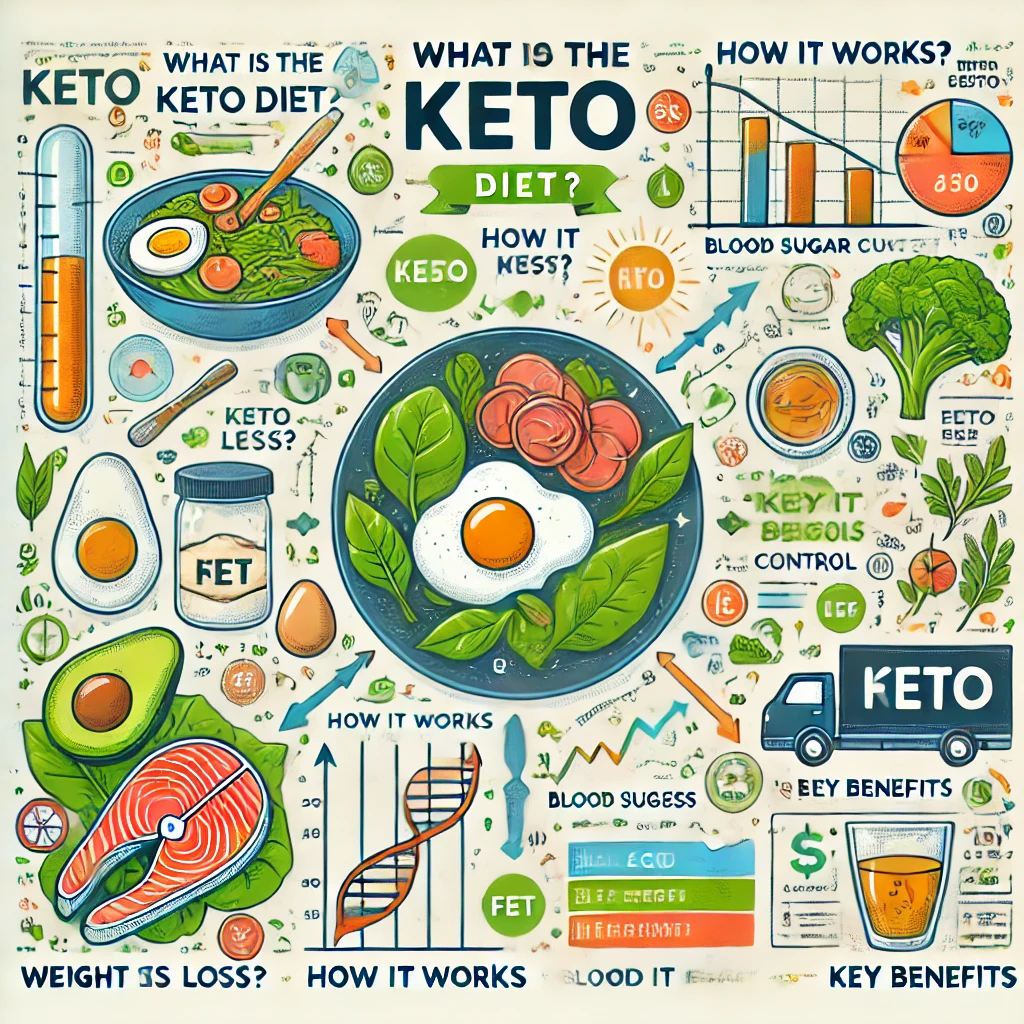
The ketogenic diet is not much different from other low-carb diets such as the Atkins diet, DEBM diet, and LCHF diet. The general idea is to drastically reduce carbohydrate intake and increase fat consumption in order to achieve a metabolic state known as ketosis.
In ketosis, the body is adapted from using carbohydrate metabolism as the primary source of energy to using fat metabolism. Fat is broken down by the liver into ketones, and the brain uses ketones as an alternative energy source.
Although ketosis is a less severe form of ketoacidosis—a potentially fatal condition most commonly linked to type 1 diabetes—research has overwhelmingly shown the keto diet to be safe and effective in general, with specific therapeutic benefits for individuals who are unable to control obesity through other means. Still, research is continually underway to identify its long-term effect and impact on general health.
Major Benefits of the Keto Diet
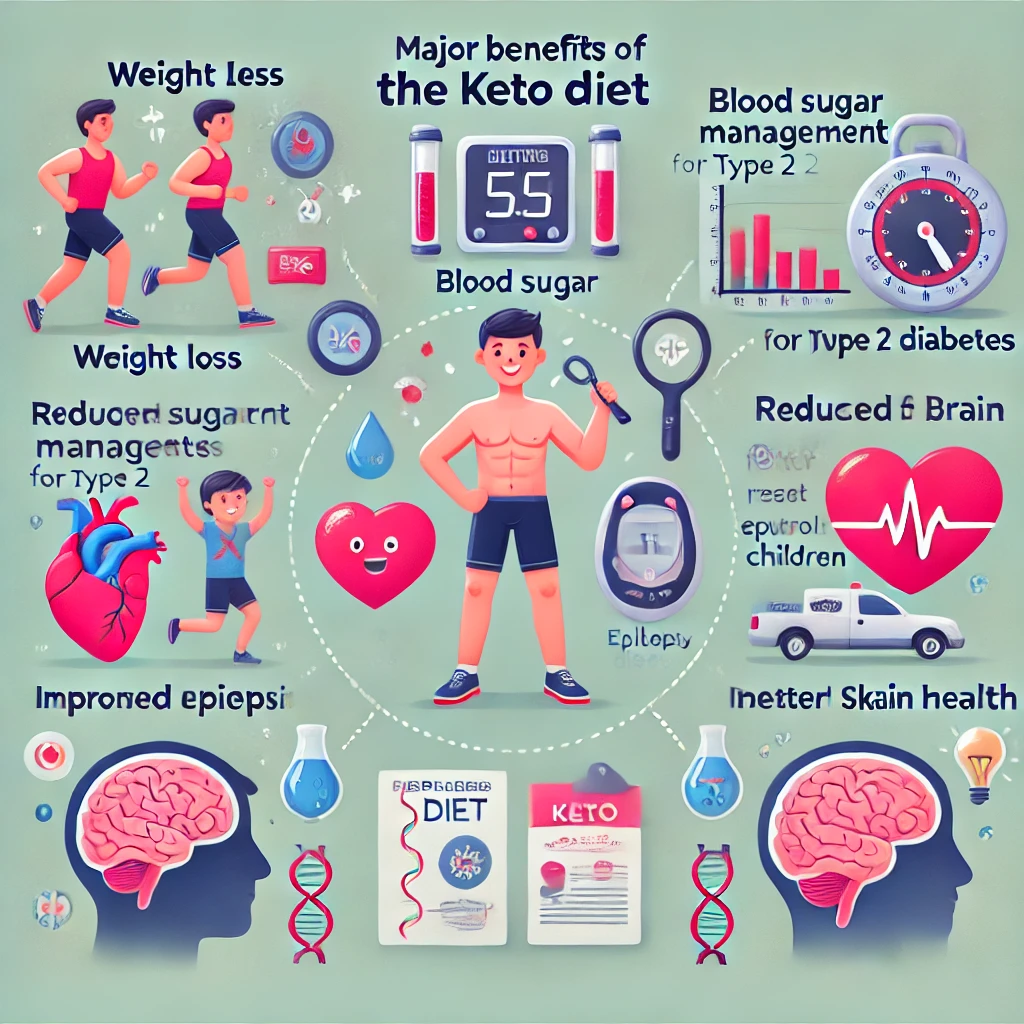
Initially intended for therapeutic purposes, the keto diet has been used in the management of certain health conditions. Some of the most significant benefits of the keto diet include:
1. Management of Blood Sugar in Type 2 Diabetic Patients
The keto diet is generally advised for type 2 diabetic patients. The diet encourages the consumption of good fats in foods like salmon, nuts, and avocados. By significantly reducing the intake of carbohydrates, the diet enhances the body’s ability to effectively store and use energy, ultimately healing the symptoms of diabetes. Individuals employing this diet need to, nonetheless, regularly monitor their blood sugar levels and ketone production to prevent complications such as ketoacidosis.
2. Reduced Risk of Heart Disease
A properly balanced keto diet that emphasizes the consumption of healthy fats can lead to a reduced risk of heart disease. This is mainly because it has the ability to lower insulin levels, which consequently has the effect of lessening the level of cholesterol that is being manufactured in the body.
3. Treating Epilepsy in Children
The keto diet, according to research, can be used in the management of epileptic seizures in children that do not respond to traditional treatment. A trial involving 150 epileptic children demonstrated that after one year of ketogenic diet, 50% of the children experienced a dramatic decrease in the frequency of seizures.
4. Guarding the Nervous System
Aside from epilepsy, the ketogenic diet is said to be advantageous to the nervous system as it may enhance neurological conditions like Alzheimer’s disease, Parkinson’s disease, and sleep disorders. The ketones are able to use the fat to dissolve it into energy more efficiently and hence keep the brain cells from becoming damaged.
Other benefits of the keto diet that have been reported are that it improves the condition of the skin by reducing acne, helps in the regulation of polycystic ovary syndrome (PCOS), and may suppress the growth of certain cancers.
How to Properly Follow the Keto Diet
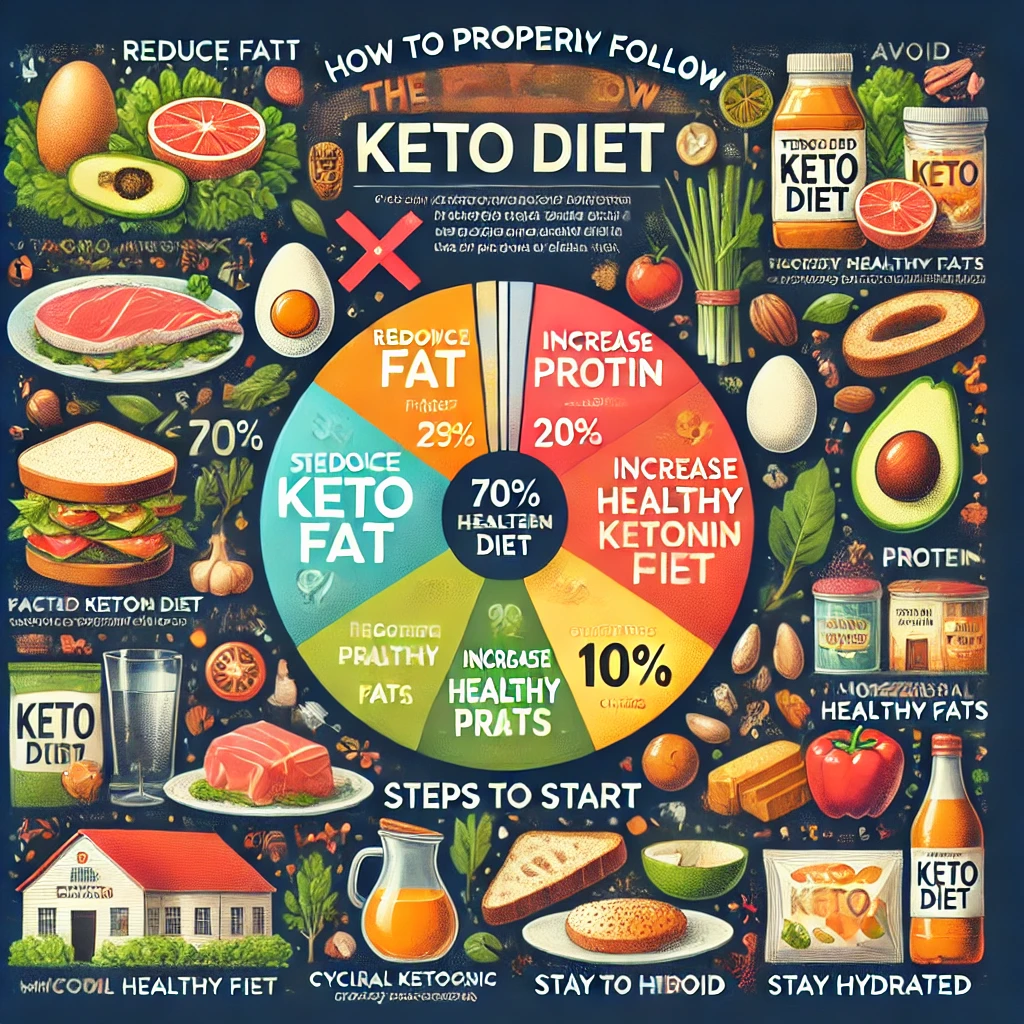
If you’re planning to attempt the keto diet, you have to be willing to severely reduce your daily carbohydrates. The two most common ways are:
- Standard Ketogenic Diet (SKD): 70% fat, 20% protein, and 10% carbohydrates.
- High-Protein Ketogenic Diet: 60% fat, 35% protein, and 5% carbohydrates.
There are also variations for athletes or bodybuilders, such as the Cyclical Ketogenic Diet (CKD) and Targeted Ketogenic Diet (TKD).
Foods to Provide and Avoid on the Keto Diet

In order to properly follow the keto diet, make sure to prioritize eating high-fat foods like:
- Eggs, especially those enriched with omega-3
- Meat, poultry, turkey, sausages, steak, and other proteins
- Fatty fish like tuna, salmon, and mackerel
- Dairy products such as cream, butter, and cheese
- Low-carbohydrate vegetables such as spinach, tomatoes, onions, and peppers
- Nuts and seeds such as almonds, sesame seeds, chia seeds, and pumpkin seeds
- Avocados, both raw and in the form of dishes
- Healthy oils like olive oil, avocado oil, and coconut oil
- Natural spices like salt, pepper, and herbs
- Then, there are foods that must be avoided, and they are:
Foods to Avoid:
- High-carb staples like rice, pasta, cereals, and wheat products
- Legumes, beans, and grains
- Starchy vegetables like potatoes, sweet potatoes, and carrots
- Sweet foods like candy, ice cream, cakes, fruit juices, and sodas
- Processed oils like vegetable oil and mayonnaise
- Alcoholic beverages
- Duration and Long-Term Considerations
- The ketogenic diet is only intended for short-term usage, ranging from 2–3 weeks to a maximum of 6–12 months. It has no other function but to reduce body fat and improve overall well-being.
Potential Risks of the Keto Diet
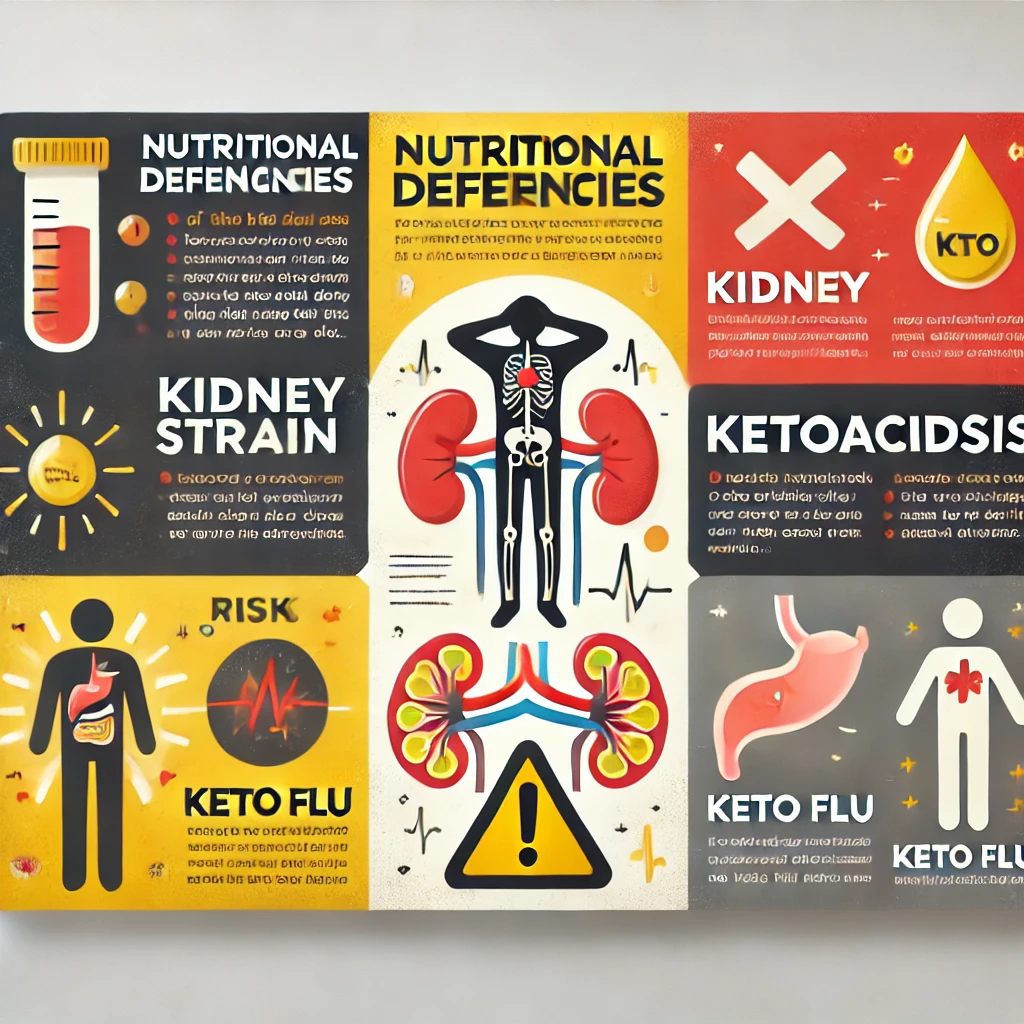
As many health benefits as the keto diet boasts, it has risks too, particularly if taken over a prolonged period. The following are potential risks:
Nutritional Deficiencies: Reduced intake of nutrient-dense carbohydrates (whole grains, fruits, legumes, and starchy vegetables) may cause insufficient intake of vitamins and minerals.
Kidney Strain: High protein intake over a long period could result in kidney damage.
Ketoacidosis: A potentially fatal metabolic imbalance if not monitored closely.
The “Keto Flu” Phenomenon
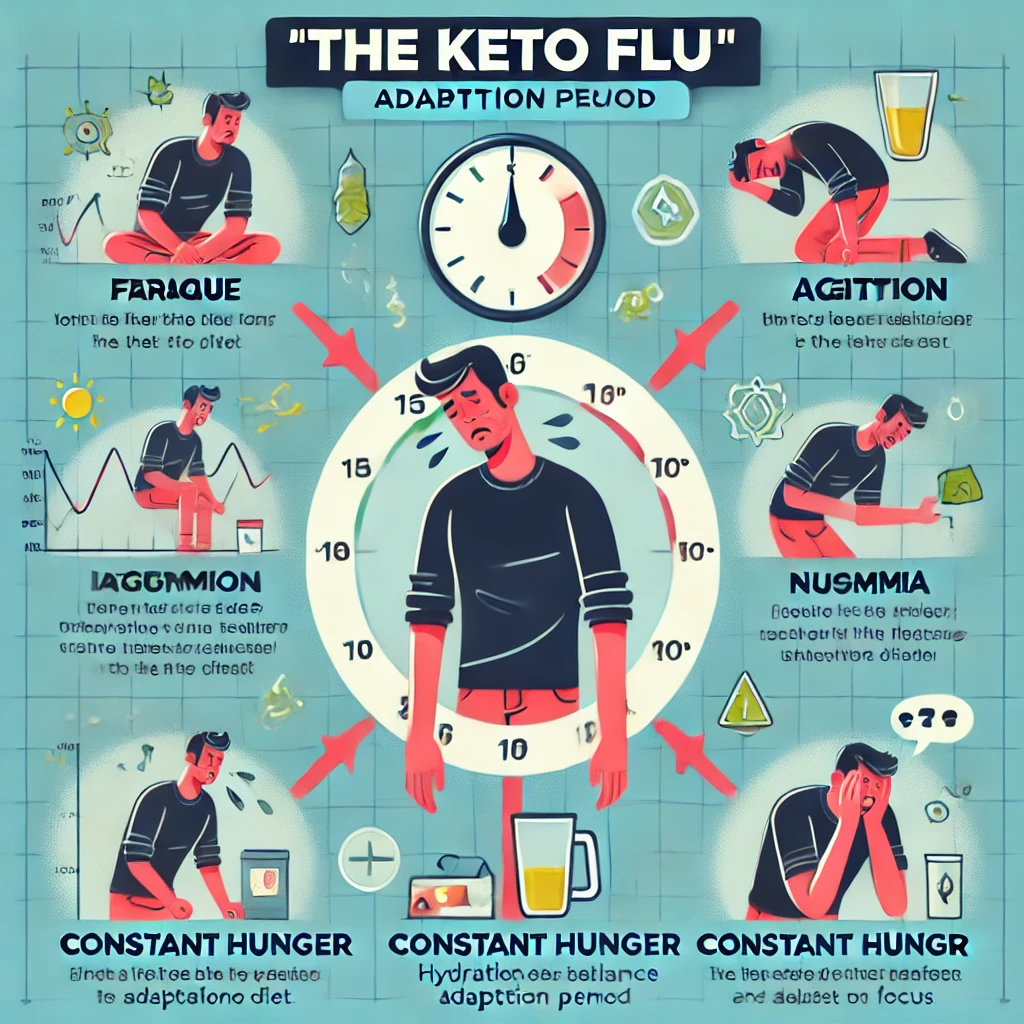
During the initial adaptation, individuals may experience “keto flu” symptoms that include:
- Fatigue
- Agitation
- Insomnia
- Nausea
- Constant hunger
- Loss of focus
- Although such symptoms are temporary and typically vanish as the body adapts, they may be challenging for novices.
No diet affects each person in the same way. Therefore, it is utterly crucial to weigh both the beneficial and potential negative effects before joining the keto diet.Please consult with a medical professional before starting to determine if this meal plan is suitable for your health status, personal needs, and physical capabilities.






